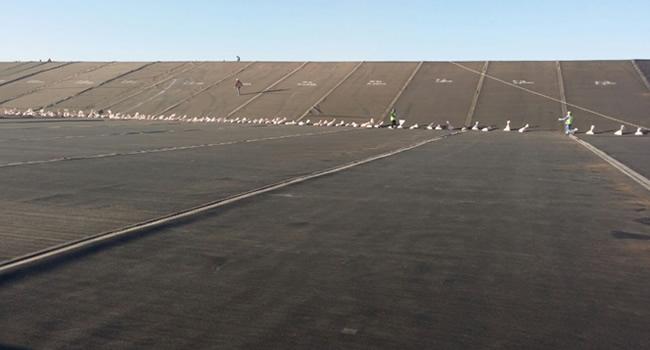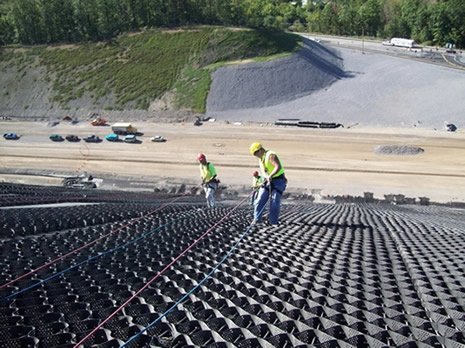At its peak and not long before it made landfall in Rockport, Texas, Hurricane Harvey was rated a Category 4 storm. It was the first major hurricane to make landfall on the Texas Gulf Coast in 12 years, and in doing so it caused an enormous amount of damage to infrastructure in Houston, which is a major center of production for petrochemicals and geosynthetics manufacturing in the United States.
Bloomberg reported on August 28 that up to 40% of ethylene production in the US had been disrupted.
Many plants were closed ahead of the storm’s arrival and it took in many cases a week or more for operations to resume.

(NOTE: This is a quick check in on the potential near-term impact of Hurricane Harvey on geosynthetics manufacturing through the lens of disrupted ethylene supply; it is not a profile of Houston-based geosynthetic manufacturing. It is Geosynthetica’s hope to publish that closer look when we are slightly further from the event and facility operators have more time to assess and tell their story.)
HARVEY’S IMPACT ON GEOSYNTHETICS MANUFACTURING
PetroChem Wire, which is one of the primary sources for daily pricing changes, business news, and forecasts for the petrochemical industry, has tracked the impact Hurricane Harvey has had on chemical and feedstock production in and around Houston. The producers based there are vital to much of geosynthetics manufacturing, construction materials production, general plastics, and far more.
As Hurricane Harvey made its second landfall on August 30, four days after its initial landfall, roughly 80% of the ethylene capacity in Texas was offline.
As of September 7, though, PetroChem Wire indicates that many facilities have restarted production. The editors write:
Restart processes have begun/are beginning at olefins units that represent nearly 60 million lbs/day of ethylene capacity. The storm had shut in an estimated 100 million pounds per day of ethylene production. More than 20 million lbs/day of Texas ethylene capacity ran throughout the storm.
Furthermore, the site notes that significant disruptions have not been found, “as comparable demand has also been lost, and on-site downstream units appear to be restarting ahead of or in tandem with olefins production as it returns.”
This is in line with what Geosynthetica has heard from manufacturers after surveying a number of companies on September 5.
GSE Environmental, one of the world’s biggest producers of high-density polyethylene geomembranes, is headquartered in Houston and operates multiple production centers in the United States and around the world.
“We have been through several hurricanes in the past and were well prepared before Hurricane Harvey hit the Texas coast,” says Steve Eckhart, Vice President Marketing for GSE. “We have sufficient raw materials in stock to produce our customer’s orders for the next four weeks.”

He also noted that the company’s raw materials suppliers were up and running and delivery plans were in place to continue business as usual.
“We performed a controlled shut down of the Houston plant before Harvey affected the Houston area,” Eckhart says.
The company is back at full production.
Similarly, PRESTO GEOSYSTEMS®, which utilizes high-density polyethylene in the production of its well-known GEOWEB® brand geocell confinement system for soil stabilization, has not been affected.
“We are keeping a close eye on all our providers for all resin blends that our products require,” says Bill Handlos, Director of Presto Geosystems. “Currently, we have no supply chain problems.”
Handlos says that Presto, while connected in various ways to the chemical and resin production industry in the Houston region, has its production facilities around the Midwest.
“If estimates stay on track for bringing resin production back online,” Handlos says, “we see no problem in servicing the market.”
POTENTIAL NEAR-TERM ISSUES
The infrastructure damage to Houston may impact the geosynthetics manufacturing market throughout the United States in some ways. For example, collapsed roads and bridges can potentially slow transportation and delivery of raw materials, though not likely in any way that will affect manufacturer response times to orders. As GSE’s example highlights, manufacturers keep ample supplies on hand to service orders. Geosynthetics manufacturers are also supported by warehousing and distribution networks for many standard rolls and pallets of materials. These strategies should blunt the impact of infrastructure issues on raw materials transportation, at least from the general marketplace.
Pricing for polyethylene may also be impacted. Recently, prices of basic feedstock were elevated, and many estimates indicated that a fourth quarter drop in price was likely. That might not occur now, depending on competition for and supply of polyethylene sources. So, prices may remain aloft or potentially edge upwards in 4Q.
Whether these disruptions will ultimately affect the general geosynthetics market pricing, it’s too early to say. Geosynthetics manufacturers connected to the Houston-area resin suppliers are performing well at the moment and, as needed, making the adjustments necessary to continue servicing the field.
**
Geosynthetica extends its thoughts to the many companies and geosynthetics-related professionals, their families, and communities in the region affected by Hurricane Harvey. A few companies based in the region have yet to respond to requests for comment. We wish them the best and hope to hear soon of their facilities being fully functional and their employees safe.











